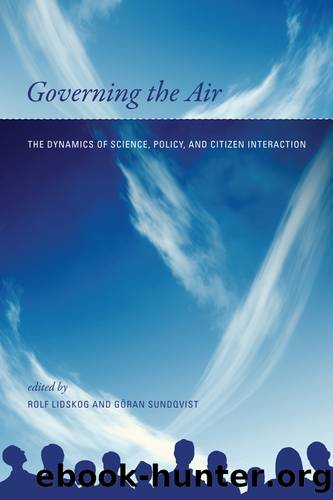Governing the Air by Unknown

Author:Unknown
Language: eng
Format: epub
ISBN: 3339337
Publisher: MIT Press
Published: 2011-08-15T00:00:00+00:00
7
Fewer Boundaries and Less Certainty:
The Role of Experts in European Air Policy
Göran Sundqvist
Scholars in the field of science and technology studies (STS) often repeat the message that the relationship between science and society is unstable. Spurred by regulatory failures in dealing with problems such as âmad cow diseaseâ (bovine spongiform encephalopathy) and public criticism of genetically modified organisms, the European Commission has prioritized expert credibility as an important issue in need of political attention. In preparing for the White Paper on Governance published in 2001, the commission set up a working group on âdemocratizing expertiseâ whose main objective was to propose ideas on how to restore the credibility of expertise (EC 2001). In 2005, the commission established an expert group consisting of STS scholars to address the widely recognized problem of public unease with science (Wynne and Felt 2007). These events and activities obviously indicate that the relationship between science and society must be strengthened; they also suggest that STS insights can contribute to this strengthening.
According to STS scholars, the problem is that the public receives conflicting advice from experts about what to think and how to act. The solution to this problem, however, is not unanimous advice, but a better understanding of how to handle disagreeing experts. The problem consists of naive expectations as to what expert advice can in fact deliverâexpectations arising from the widely held but misleading view that scientific advice is certain. This false aura of certainty surrounding the role of the scientific expert is the main problem and the source of unrealistic expectations (Collins and Pinch 1993, 1998, 2005; Shapin 1995; Latour 1998; Hilgartner 2000; Wynne 2001; Jasanoff 2003; Irwin 2006; cf. Callon, Lascoumes, and Barthe 2009). When conflicting advice is understood from the perspective of certainty, problems arise. The solutions to the problem, according to STS, are for scientific experts to stop presenting their work as about certainty and for the public to lower its expectations and to understand that science, like all other human enterprises, is uncertain and fallible. The only way to strengthen expert credibility is to foster a realistic understanding of what science is and what it can provide to policymakers.
Doubts can be raised, though, as to whether this view is applicable to all policy areas in that there seem to be some instances of stable and trusting cooperation between scientific experts, policymakers, and the general public. One of the most obvious examples of such cooperation is European air policy. For almost four decades, scientific experts from all over Europe have cooperated in developing a scientific understanding of the problems related to long-range transboundary air pollution. Policymakers, with strong public support, have based their negotiations on this foundation, which has led to seven binding protocols on emission-reduction commitments.
Expert conflicts as well as exaggerated expectations on the part of the public have been part of this story, but the result has not been instability or decreased expert credibility. How can this result be explained? In what ways has the interaction between science
Download
This site does not store any files on its server. We only index and link to content provided by other sites. Please contact the content providers to delete copyright contents if any and email us, we'll remove relevant links or contents immediately.
The Radium Girls by Kate Moore(12022)
100 Deadly Skills by Clint Emerson(4922)
Rise and Kill First by Ronen Bergman(4784)
The Templars by Dan Jones(4686)
The Doomsday Machine by Daniel Ellsberg(4489)
The Rape of Nanking by Iris Chang(4209)
Killing England by Bill O'Reilly(4001)
Stalin by Stephen Kotkin(3963)
Hitler in Los Angeles by Steven J. Ross(3944)
12 Strong by Doug Stanton(3545)
Hitler's Monsters by Eric Kurlander(3335)
Blood and Sand by Alex Von Tunzelmann(3201)
The Code Book by Simon Singh(3188)
Darkest Hour by Anthony McCarten(3125)
The Art of War Visualized by Jessica Hagy(3006)
Hitler's Flying Saucers: A Guide to German Flying Discs of the Second World War by Stevens Henry(2754)
Babylon's Ark by Lawrence Anthony(2676)
The Second World Wars by Victor Davis Hanson(2524)
Tobruk by Peter Fitzsimons(2515)
